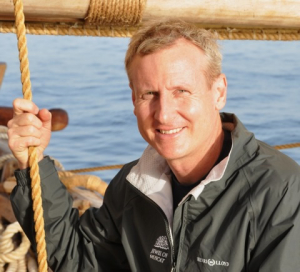
Robert Jackson
Winds, stars and dolphins
18th February 2010
Robert Jackson
As one can see from the website map, we’ve made good progress the last two nights, only to have our gains erased by a combination of very low or even contrary winds during the day
It’s a frustrating situation because everyone has worked hard to take advantage of what wind we have, but India doesn’t seem to be getting much closer. Nevertheless, this situation is no different from that which bedevilled seafarers since the dawn of sailing, so we take it in stride and hope for better winds soon. And we are indeed confident they will come soon.
Late last night, when we were making good headway, three dolphins seemed to take great delight in playing in our bow-wake. These beautiful animals have been welcome friends of mariners since ancient times and we regarded their arrival as a good omen for the future.
Low wind doesn’t mean that life on board isn’t busy. Indeed, the crew works hard at the sails and lines trying to harness the breeze as efficiently as possible. In addition, there’s always maintenance of the rigging, electronic systems, manual pumps, and keeping the decks clean and organized.
Today we also held man-overboard and fire drills. Both went fairly well, but we need to improve our response time and learn from some of our small errors in procedures. While deploying the rubber rescue during today’s drill, one of the goats on deck suffered a cut to its head, but our medical supplies proved sufficient for the case and the well-bandaged goat is fine.
We are all getting used to the traditional maritime system of maintaining “watches”. The Jewel’s crew is divided into two watches – Port and Starboard. Thus far, the duration of each watch has been four hours, so one never sleeps for more than four hours at a time. Last night those of us in the “Port” group were on watch from 8:00 to midnight, and from 4:00 to 8:00.
It is, of course difficult to get out of one’s bunk and up onto the deck to work in the cold wind, but a cup of hot tea made by our excellent cook, Ahmed Al Adawi, is a welcome pleasure. So too is the astonishing immensity of stars which stretches from horizon to horizon.
Last night, Scorpius was particularly impressive in the southern sky. The brightest star in this enormous constellation, Antares, is 3,000 times as luminous as our own star. Ancient Arab mariners were masters of celestial navigation and, while standing night watch on the deck of the Jewel of Muscat, one can’t help but feel an acute sense of awe and respect for the sailors of years ago who used their knowledge of the heavens to unite much of the Indian Ocean world in faith and trade.
